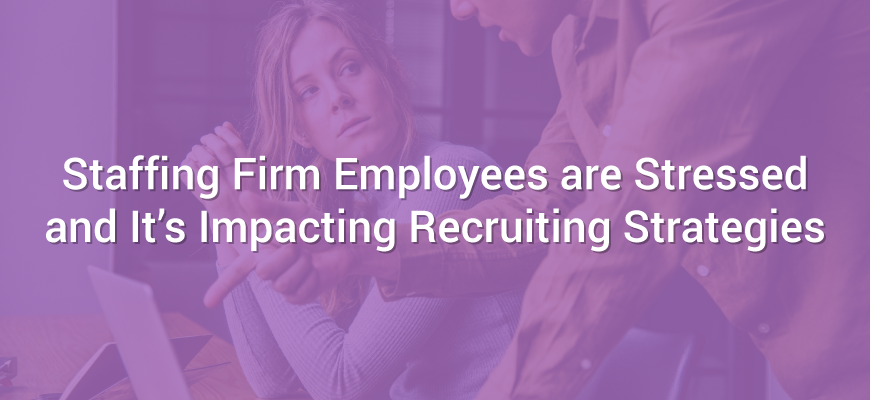At least, 40 percent of people experience persistent stress or excessive anxiety in their daily lives, according to a survey by the Anxiety Disorders Association of America (ADAA). More alarmingly, however, 72 percent of people who battle daily stress and anxiety say it interferes with their lives.
For those in the fast-paced, competitive staffing industry, stress is a major factor. Recruiters are constantly racing to find and secure top talent, understand client expectations, and maintain the flow of new clientele.
And with the majority of fast-growing companies planning on increasing hiring this year, according to a recent report by our team at Spark Hire, the pressure is higher than ever. The truth is, while your recruiting strategies are focused on finding and placing top talent, workplace stressors may be overwhelming your team.
Fortunately, mental health awareness is on the rise. Be certain you understand how staffing industry stress impacts your employees before it causes your recruiting strategies and staff to crumble:
1. Relationships are suffering
Relationships, both internal and external, are the key to successful recruiting strategies. Those suffering from stress are more likely to retreat, overreact or be constantly on edge. Additionally, their ability to exercise emotional intelligence decreases, making it challenging to genuinely connect with candidates.
In fact, according to the previously mentioned ADAA survey, 51 percent of people say stress and anxiety adversely affects their relationships with co-workers and peers. Undoubtedly, when it comes to quickly connecting with candidates, that impact is greater.
Rebuilding internal relationships takes time and becomes increasingly difficult to balance while improving external connections. When relationships deteriorate in your staffing firm, productivity and retention will also suffer creating a ripple effect through the workplace.
2. Judgement is clouded
The most effective recruiting strategies are based on your team’s ability to make quick, clear judgements. Your employees need to find candidates who fit with clients’ company cultures, roll with unexpected client decisions, and recognize potential in candidates who aren’t the most obvious choice on strict deadlines.
Unfortunately, 50 percent of ADAA’s respondents said stress and anxiety impacts their quality of work. And another 56 percent say it impacts workplace performance. This means workplace stress isn’t just hurting your employees, it’s taking the company’s overall goals and values down with them.
When staffing pros aren’t given the opportunity to re-energize during peak recruiting periods, they can quickly spiral out. Without the ability to make clear, concise decisions, staffing industry recruiters end-up sending clients ill-fitting candidates. This breaks trust with clients and candidates, alike.
Also, slow communication and decisions deter top talent from continuing with their application — or ever working with your team again. Imagine the damage if more than one employee is suffering from high amounts of stress at the same time.
3. Retention is dropping
Employees with elevated stress levels have a decreased ability to experience job satisfaction.
Lowered job satisfaction, in turn, causes retention to drop. This results in having to juggle your own internal recruiting efforts along with the demands of clients.
Worse yet, high turnover hurts your company’s image and relationships with clients. Current clients will grow tired of acquainting your new employees with their goals, expectations, and processes. As this reputation spreads to potential clients, they’ll question your ability to handle their recruiting efforts.
The good news is, you can decrease chronic stress in your workplace and focus on improving recruiting strategies simultaneously by setting a positive example.
Let employees know when you’re leaving the office, why, and when you expect them to leave, as well. This sets a pattern for better well-being initiatives and lets employees know they’re encouraged to prioritize work-life balance and self-care.
How are you decreasing stress while improving recruiting strategies for your staffing employees? Let us know!











